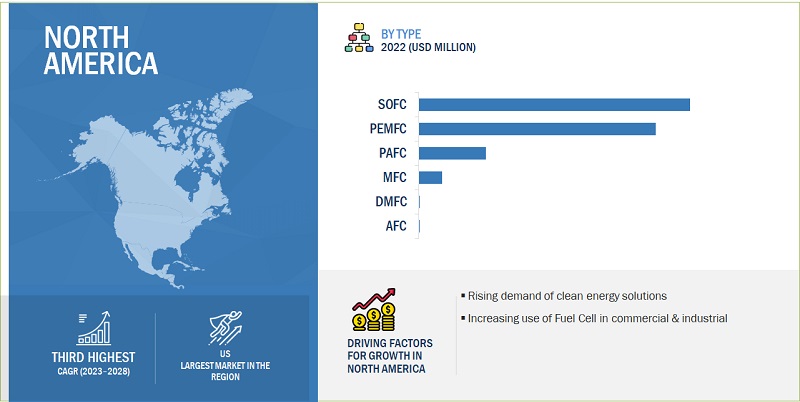The global fuel cell market is projected to reach USD 8.7 billion by 2028 from an estimated USD 3.3 billion in 2023, at a CAGR of 21.7% during the forecast period. The growing use of electronic devices in emergency, off-grid, and automotive applications will benefit the fuel cell generator business.
This report segments the fuel cell market based on type into proton exchange membrane fuel cell, solid oxide fuel cell, phosphoric acid fuel cell, alkaline fuel cell, microbial fuel cell and others. Solid Oxide Fuel Cells (SOFCs) stand out due to their prolonged longevity, exceptional efficiency, and straightforward operation. Operating at temperatures reaching 1,000°C, these cells prove ideal for heating systems across commercial, industrial, and residential settings. Moreover, they excel in extracting process heat within power plants and combined heat and power facilities. Their expansive electro-conversion area contributes to their notably high efficiency compared to other fuel cell types. The resultant chemical reaction primarily yields heat and water (H2O) as byproducts, distinguishing SOFCs for their efficacy and minimal environmental impact.
Download PDF Brochure – https://www.marketsandmarkets.com/pdfdownloadNew.asp?id=348
Based on the size, the fuel cell market is segmented into small scale, and large scale. Large scale is expected to hold the largest market share during the forecast period. Larger fuel cells can attain greater efficiencies by effectively managing heat and having a more favorable ratio of surface area to volume. This capability allows them to sustain ideal operating conditions more efficiently than smaller cells, leading to an overall enhancement in efficiency.
Based on region, the fuel cell market is segmented into North America, Europe, Asia Pacific, and rest of the world. Asia pacific is expected to hold the largest market share during the forecast period. The rapid industrialization, urbanization, and economic growth in the region drive the fuel cell market.

This report segments the fuel cell market based on application into four categories: portable, stationary, and fuel cell vehicles. Stationary is expected to hold the largest market share during the forecast period. Stationary fuel cells are engineered to supply power in specific, unchanging locations. Their applications encompass backup power generation, primary power production, and combined heat and power generation, serving industries like data centers, utilities, commercial enterprises, households, and more.
Based on end-user, the fuel cell market is segmented into transportation, commercial & industrial, residential, data center, utilities and government/municipal institutes, and military & defense. The transportation is expected to hold the largest market share during the forecast period. Fuel cells are increasingly pivotal in the transportation sector, serving dual purposes: providing primary propulsion power and extending the operational range of electric vehicles. Concerns regarding emissions in transportation are pressing, with a typical passenger car emitting around 4.7 metric tons of CO2 annually. Heavy commercial vehicles, in comparison, emit even more greenhouse gases, emphasizing the urgency to curb automotive emissions, especially in trucks and buses. Countries worldwide have been actively striving to reduce transportation emissions for several years now. Fuel cells, unlike traditional internal combustion engines (ICEs), offer zero emissions and double the efficiency, akin to battery electric drives.
Request Sample Pages – https://www.marketsandmarkets.com/requestsampleNew.asp?id=348
Key Market Players
The major players in the Fuel Cell market include Bloom Energy (US), Doosan Fuel Cell Co., Ltd. (South Korea), Aisin Corporation (Japan), Plug Power Inc. (US), and KYOCERA Corporation (Japan).
